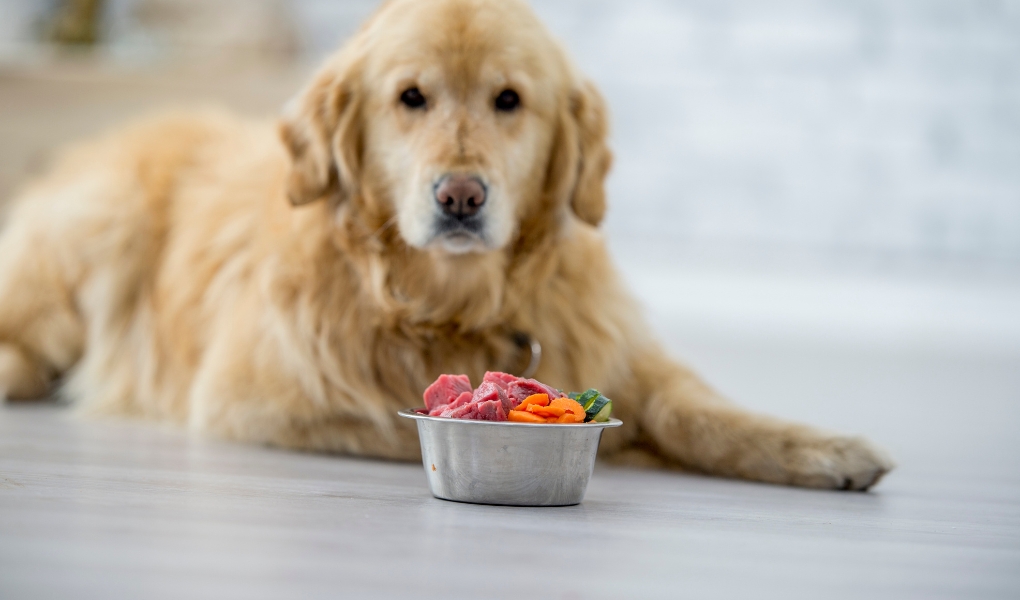Table of Contents
ToggleA Comprehensive Guide
As dogs age, their nutritional needs change, making it crucial to provide them with a diet that supports their health and well-being in their golden years. Senior dog food is specially formulated to meet the unique dietary requirements of aging dogs, helping to manage common age-related health issues and maintain a good quality of life. In this comprehensive guide, we’ll explore what senior dog food is, its benefits, and how to choose the right one for your aging pet.
Introduction to Senior Dog Food
Senior dog food is a type of pet food specifically designed to meet the nutritional needs of older dogs. As dogs age, they undergo various physiological changes that affect their metabolism, immune system, digestive health, and mobility. Senior dog food addresses these changes by providing a balanced diet that supports overall health while targeting specific age-related concerns.
When Should You Switch to Senior Dog Food?
The transition to senior dog food generally depends on your dog’s breed, size, and individual health condition. Typically, dogs are considered seniors around:
- Small breeds (under 20 lbs): 10-12 years old
- Medium breeds (20-50 lbs): 8-10 years old
- Large breeds (50-100 lbs): 6-8 years old
- Giant breeds (over 100 lbs): 5-7 years old
However, the exact timing may vary depending on your dog’s health and activity level. A consultation with your veterinarian can help determine the best time to make the switch.
Nutritional Needs of Senior Dogs
As dogs age, their nutritional requirements change. Senior dog food is formulated to address these specific needs:
Lower Caloric Content
- Reduced Metabolism: Aging dogs tend to have slower metabolisms and are often less active, requiring fewer calories to maintain a healthy weight. Senior dog food typically has a lower caloric density to prevent weight gain and obesity.
High-Quality Protein
- Muscle Maintenance: Older dogs may experience muscle loss (sarcopenia), making high-quality protein essential for maintaining muscle mass and supporting overall health.
- Easily Digestible: Senior dog food often includes protein sources that are easier to digest, such as chicken, fish, or lamb, to accommodate aging digestive systems.
Joint and Mobility Support
- Glucosamine and Chondroitin: Many senior dog foods contain added glucosamine and chondroitin, which support joint health and help manage arthritis or joint pain common in older dogs.
- Omega-3 Fatty Acids: Ingredients like fish oil are rich in omega-3 fatty acids, which reduce inflammation and support joint health.
Digestive Health
- Increased Fiber: Senior dog food often includes higher fiber content to support healthy digestion and prevent constipation, a common issue in older dogs.
- Probiotics: Some formulas contain probiotics to promote gut health and improve nutrient absorption.
Antioxidants and Immune Support
- Vitamins and Minerals: Senior dogs benefit from additional antioxidants, such as vitamins E and C, which support immune function and protect against age-related diseases.
- Beta-Carotene: Often included for its immune-boosting properties and to support eye health.
Heart Health
- Taurine and L-Carnitine: These amino acids are often added to senior dog food to support heart health, especially in breeds prone to heart disease.
- Low Sodium: Reduced sodium levels help prevent high blood pressure and other cardiovascular issues in senior dogs.
Dental Health
- Kibble Size and Texture: Senior dog food may feature smaller, softer kibble to accommodate dental issues or missing teeth. Some formulas also include ingredients that help reduce plaque and tartar buildup.
Benefits of Senior Dog Food
Switching to a senior dog food can provide several benefits that enhance your aging dog’s quality of life:
Weight Management
- Controlled Caloric Intake: Senior dog food helps manage your dog's weight by providing the right balance of calories and nutrients, preventing obesity and related health issues.
Improved Mobility
- Joint Support: Ingredients like glucosamine, chondroitin, and omega-3 fatty acids help maintain joint health, reducing pain and improving mobility in senior dogs.
Enhanced Digestive Health
- Fiber and Probiotics: Increased fiber and added probiotics promote healthy digestion, reduce constipation, and improve overall gastrointestinal health.
Better Immune Function
- Antioxidants: Senior dog food provides antioxidants that support the immune system, helping your dog fight off infections and age-related diseases.
Healthy Skin and Coat
- Omega Fatty Acids: Essential fatty acids help maintain healthy skin and a shiny coat, reducing issues like dry skin or dandruff common in older dogs.
Cognitive Health
- DHA and Antioxidants: Some senior dog foods include DHA and other brain-supporting nutrients that may help slow cognitive decline in aging dogs.
How to Choose the Right Senior Dog Food
Choosing the right senior dog food requires consideration of your dog’s specific needs and preferences:
Consider Your Dog's Health Conditions
- Joint Issues: Look for foods with added glucosamine and chondroitin if your dog has arthritis or joint pain.
- Heart Health: If your dog has heart issues, choose a food with added taurine and low sodium content.
Read the Ingredient List
- High-Quality Protein: Ensure the food lists a high-quality protein source as the first ingredient.
- Avoid Fillers: Avoid foods with excessive fillers like corn, soy, or wheat, which provide little nutritional value.
Consult Your Veterinarian
- Personalized Advice: Your veterinarian can recommend specific brands or formulas that best meet your senior dog's unique needs.
Trial and Observation
- Monitor Your Dog's Response: When switching to a new food, monitor your dog's weight, energy levels, and overall health. Adjust portions or try a different formula if needed.
Homemade vs. Commercial Senior Dog Food
While commercial senior dog foods are convenient and nutritionally balanced, some owners prefer to prepare homemade meals:
Homemade Senior Dog Food
- Customization: Allows you to tailor the diet to your dog's specific needs, especially if they have allergies or food sensitivities.
- Nutritional Balance: Requires careful planning to ensure all essential nutrients are included. Consider working with a veterinary nutritionist.
Commercial Senior Dog Food
- Convenience: Pre-formulated and balanced, making it easy to feed your dog.
- Variety: Available in various flavors and types, including dry kibble, wet food, and freeze-dried options.
Common Myths About Senior Dog Food
Myth: All Senior Dogs Need Low-Protein Diets
- Fact: While some senior dogs may benefit from reduced protein, most need high-quality protein to maintain muscle mass. Consult your vet to determine the appropriate protein level for your dog.
Myth: Senior Dog Food Is Just a Marketing Gimmick
- Fact: Senior dog foods are specially formulated with ingredients that address the unique needs of aging dogs, such as joint support, digestive health, and immune function.
Myth: Homemade Food Is Always Better
- Fact: Homemade diets can be beneficial but require careful planning to ensure they are nutritionally balanced. Commercial senior dog foods are specifically designed to meet the dietary needs of older dogs.
Transitioning to Senior Dog Food
Gradual Transition
- Mixing Old and New Food: Gradually introduce the new senior dog food by mixing it with your dog's current food over a period of 7-10 days to avoid digestive upset.
Monitor for Reactions
- Check for Allergies or Sensitivities: Watch for any signs of food allergies or sensitivities, such as itching, vomiting, or diarrhea. If any issues arise, consult your vet.
Adjust Portions
- Modify Feeding Amounts: Senior dog food may be more nutrient-dense, so you may need to adjust portion sizes to avoid overfeeding.
Conclusion
Senior dog food is designed to meet the unique nutritional needs of aging dogs, providing them with the essential nutrients required to maintain their health and well-being in their golden years. By understanding what senior dog food is and how it can benefit your dog, you can make informed decisions that support your pet’s long-term health. Always consult your veterinarian when choosing the right food for your senior dog, and monitor their health to ensure they thrive on their new diet. For more expert insights and comprehensive guides, explore our other blog posts at Harmony Dog Food.






